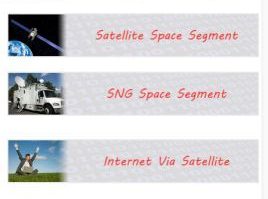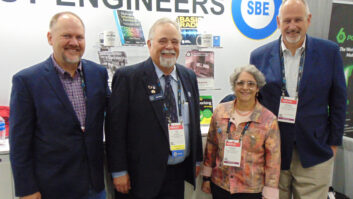
Among the staff at the Orbital Media Networks Network Operations Center in Englewood, Colo., from left, are NOC Operator Steve Schelgunov, Director of Operations Nate Butler, NOC Manager Matt Hebert, NOC Operator James Hebert, Administrative Assistant Kristen Thoburn (front) and intern Jonathan Hagans. Not pictured are NOC Operators Brian Anderson, Brandon Fuller and Jeff Wilkinson and Accountant Kristen Myers. A new company has acquired the former Clear Channel Satellite Services and is continuing support of its clients.
Radio World reported in November that CCSS parent iHeartMedia planned to stop services to non-iHeartMedia users. Business observers speculated at the time that the big company preferred not to be in the business of providing backbone transport capacity to competitors of its own stations and other holdings. At the time a spokeswoman told RW only that its move to cease programming distribution to outside clients was a strategic business decision.
The move set off a scramble among some users to find alternate providers.
Now the CCSS satellite and distribution business (which, very briefly, bore the name iHeartMedia Satellite Services) has been acquired and its name changed to Orbital Media Networks. Its owner and president is Sam Dibrell Jr.
“Orbital Media Networks Inc. will continue to operate from the Englewood, Colo., facility previously occupied by CCSS with no interruption in satellite service or customer support,” Dibrell told clients in a letter.
“The previous notification made by CCSS regarding discontinuation of satellite services is officially rescinded, and we are honoring all existing customer contracts under their original terms.”
The purchase price was not disclosed.
BACKBONE
Orbital Media Networks provides satellite and terrestrial distribution capacity in the continental United States, leasing time on transponders and providing its clients with access to specialized distribution infrastructure. It thus will compete for media clients with entities like NPR Satellite Services and Cumulus, who also offer such capacity.
Perhaps a quarter of its business also comes from non-broadcast users who need paging, VoIP and disaster recovery services. A company might need phone and Internet connectivity at a construction site or remote business location; an emergency response team might need satellite equipment for Internet or connection of VoIP to keep communication lines open. A financial firm might need to keep data flowing when a disaster knocks out its usual lines of communication.
Dibrell is an Internet entrepreneur and former volunteer fire chief. In building his career, he said he found he could combine his business acumen with a passion for public safety.
“My company was in the business of providing IP over satellite to emergency response entities in and around Texas,” he told me in a phone call. If an emergency medical task force needed to deploy, it could use his infrastructure to communicate via data and voice with the control center. For instance in 2008 his company provided hardware and services in support of incident command and medical responders on Galveston Island in Hurricane Ike. In this way, emergency responders didn’t need to deal with “space segment” directly.
He also was a customer of CCSS, which provided him with IP-over-satellite services to resell. When he heard about the planned closure, he approached iHeartMedia about the possibility of purchasing and continuing operations.
I asked why he wanted to get into this particular business. While protecting his existing clients was the initial impetus — “I would have had to source a different provider, and my customers would have to re-source infrastructure” — he told me that, ultimately, he considers this an excellent business venture.
“There is a niche market out there that we feel is underserved; we’re going after it with gusto.” Satellite and Internet capacity is “a critical component of radio distribution and IP distribution. A lot of independent stations depend on the services we offer for their business continuity. They were going to have to find separate resources with a high quality of service.”

Sam Dibrell Jr. The company offers a range of platforms, from the older Starguide system and newer X-Digital Systems receivers, to IP distribution using hubs from Advantech and Romantis that allow further specialization and regionalization. “We offer the full spectrum so customers can choose.”
Though terrestrial Internet capacity is a growing part of the picture, he said, IP multicast can involve timing issues that satellite does not; this is important, for instance, if a syndicator wants to simulcast around the country and can’t tolerate a difference of several seconds in delivery.
So the company introduced new media content receivers two or three years ago, expanding features like store-and-forward and regionalization. More recently it has been helping affiliates through a transition from the AMC-1 satellite to a better signal from SES-3.
Dibrell is pleased with the 20,000-square-foot, high-security facility near Denver that he has acquired. “Englewood is a data center with multiple divergent paths for terrestrial and RF sides. It’s a significant facility, access-controlled; with generator and AC redundancy. It’s a high-level data center.”
The Orbital business employs about a dozen people; Dibrell expects the number eventually will settle at about 15. Dibrell told me many of the earlier staff remain on board, including Nathan Butler, director of operations; Orbital has been negotiating with several others, whose status was pending when we spoke.
Meanwhile, between now and June, the company is “migrating off” iHeartMedia stations that stay with their parent. That handoff is being managed by Mike Hagans, former president and general manager of CCSS, who remains an iHeartMedia employee. (I contacted iHeartMedia to comment for this story but had not heard back as this issue went to press.)
Dibrell is in the process of moving the company from being part of a conglomerate to more of an agile startup. “We’re debt-free; and a primary goal is to operate in the black the first year.” The most frequent question he is hearing from customers right now is about existing contracts.
“We will honor all contracts; and we’re open to new contracts, new markets. Pretty much any that can benefit from satellite transport, whether Single Channel Per Carrier, Multiple Channels Per Carrier … We’re here, and we’re here to stay.”












